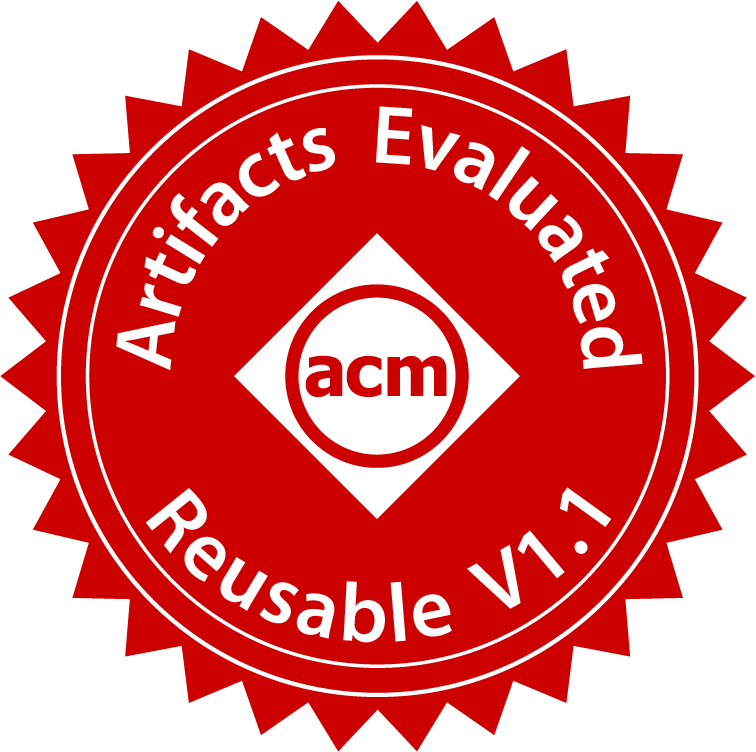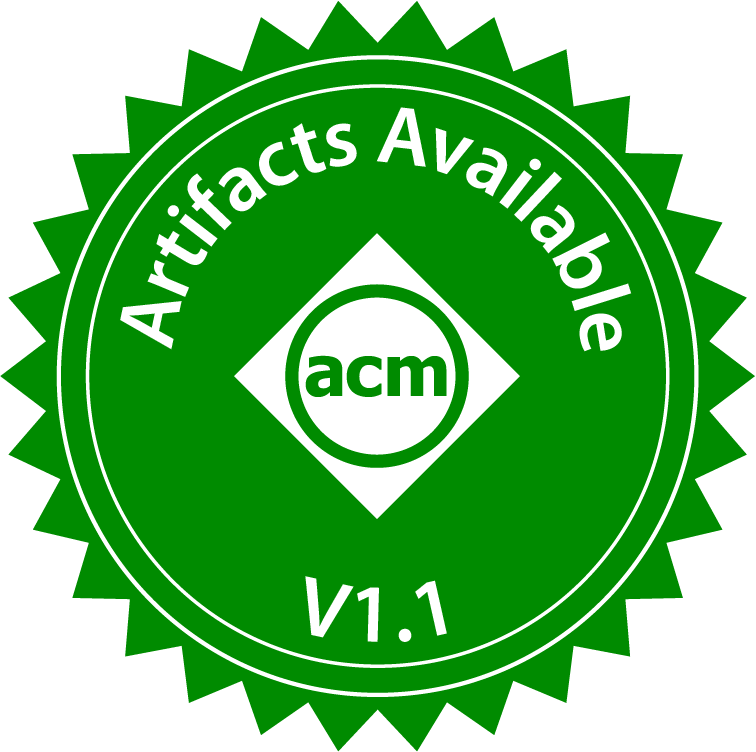Artifact repository for the paper Lost in Translation: A Study of Bugs Introduced by Large Language Models while Translating Code, accepted at ICSE 2024, Lisbon, Portugal. Authors are Rangeet Pan* Ali Reza Ibrahimzada*, Rahul Krishna, Divya Sankar, Lambert Pougeum Wassi, Michele Merler, Boris Sobolev, Raju Pavuluri, Saurabh Sinha, and Reyhaneh Jabbarvand.
This repository contains the source code for reproducing the results in our paper. Please start by cloning this repository:
git clone https://github.com/Intelligent-CAT-Lab/PLTranslationEmpirical
We recommend using a virtual environment for running the scripts. Please download conda 23.11.0 from this link. You can create a virtual environment using the following command:
conda create -n plempirical python=3.10.13
After creating the virtual environment, you can activate it using the following command:
conda activate plempirical
You can run the following command to make sure that you are using the correct version of Python:
python3 --version && pip3 --version
To install all software dependencies, please execute the following command:
pip3 install -r requirements.txt
As for hardware dependencies, we used 16 NVIDIA A100 GPUs with 80GBs of memory for inferencing models. The models can be inferenced on any combination of GPUs as long as the reader can properly distribute the model weights across the GPUs. We did not perform weight distribution since we had enough memory (80 GB) per GPU.
Moreover, for compiling and testing the generated translations, we used Python 3.10, g++ 11, GCC Clang 14.0, Java 11, Go 1.20, Rust 1.73, and .Net 7.0.14 for Python, C++, C, Java, Go, Rust, and C#, respectively. Overall, we recommend using a machine with Linux OS and at least 32GB of RAM for running the scripts.
For running scripts of alternative approaches, you need to make sure you have installed C2Rust, CxGO, and Java2C# on your machine. Please refer to their repositories for installation instructions. For Java2C#, you need to create a .csproj file like below:
<Project Sdk="Microsoft.NET.Sdk">
<PropertyGroup>
<OutputType>Exe</OutputType>
<TargetFramework>net7.0</TargetFramework>
<ImplicitUsings>enable</ImplicitUsings>
<Nullable>enable</Nullable>
</PropertyGroup>
</Project>
We uploaded the dataset we used in our empirical study to Zenodo. The dataset is organized as follows:
Please download and unzip the dataset.zip file from Zenodo. After unzipping, you should see the following directory structure:
PLTranslationEmpirical
├── dataset
├── codenet
├── avatar
├── evalplus
├── real-life-cli
├── ...
The structure of each dataset is as follows:
-
CodeNet & Avatar: Each directory in these datasets correspond to a source language where each include two directories
CodeandTestCasesfor code snippets and test cases, respectively. Each code snippet has anidin the filename, where theidis used as a prefix for test I/O files. -
Evalplus: The source language code snippets follow a similar structure as CodeNet and Avatar. However, as a one time effort, we manually created the test cases in the target Java language inside a maven project,
evalplus_java. To evaluate the translations from an LLM, we recommend moving the generated Java code snippets to thesrc/main/javadirectory of the maven project and then running the commandmvn clean test surefire-report:report -Dmaven.test.failure.ignore=trueto compile, test, and generate reports for the translations. -
Real-life Projects: The
real-life-clidirectory represents two real-life CLI projects from Java and Python. These datasets only contain code snippets as files and no test cases. As mentioned in the paper, the authors manually evaluated the translations for these datasets.
We provide bash scripts for reproducing our results in this work. First, we discuss the translation script. For doing translation with a model and dataset, first you need to create a .env file in the repository and add the following:
OPENAI_API_KEY=<your openai api key>
LLAMA2_AUTH_TOKEN=<your llama2 auth token from huggingface>
STARCODER_AUTH_TOKEN=<your starcoder auth token from huggingface>
- Translation with GPT-4: You can run the following command to translate all
Python -> Javacode snippets incodenetdataset with theGPT-4while top-k sampling isk=50, top-p sampling isp=0.95, andtemperature=0.7:
bash scripts/translate.sh GPT-4 codenet Python Java 50 0.95 0.7 0
- Translation with CodeGeeX: Prior to running the script, you need to clone the CodeGeeX repository from here and use the instructions from their artifacts to download their model weights. After cloning it inside
PLTranslationEmpiricaland downloading the model weights, your directory structure should be like the following:
PLTranslationEmpirical
├── dataset
├── codenet
├── avatar
├── evalplus
├── real-life-cli
├── CodeGeeX
├── codegeex
├── codegeex_13b.pt # this file is the model weight
├── ...
├── ...
You can run the following command to translate all Python -> Java code snippets in codenet dataset with the CodeGeeX while top-k sampling is k=50, top-p sampling is p=0.95, and temperature=0.2 on GPU gpu_id=0:
bash scripts/translate.sh CodeGeeX codenet Python Java 50 0.95 0.2 0
- For all other models (StarCoder, CodeGen, LLaMa, TB-Airoboros, TB-Vicuna), you can execute the following command to translate all
Python -> Javacode snippets incodenetdataset with theStarCoder|CodeGen|LLaMa|TB-Airoboros|TB-Vicunawhile top-k sampling isk=50, top-p sampling isp=0.95, andtemperature=0.2on GPUgpu_id=0:
bash scripts/translate.sh StarCoder codenet Python Java 50 0.95 0.2 0
- For translating and testing pairs with traditional techniques (i.e., C2Rust, CxGO, Java2C#), you can run the following commands:
bash scripts/translate_transpiler.sh codenet C Rust c2rust fix_report
bash scripts/translate_transpiler.sh codenet C Go cxgo fix_reports
bash scripts/translate_transpiler.sh codenet Java C# java2c# fix_reports
bash scripts/translate_transpiler.sh avatar Java C# java2c# fix_reports
- For compile and testing of CodeNet, AVATAR, and Evalplus (Python to Java) translations from GPT-4, and generating fix reports, you can run the following commands:
bash scripts/test_avatar.sh Python Java GPT-4 fix_reports 1
bash scripts/test_codenet.sh Python Java GPT-4 fix_reports 1
bash scripts/test_evalplus.sh Python Java GPT-4 fix_reports 1
- For repairing unsuccessful translations of Java -> Python in CodeNet dataset with GPT-4, you can run the following commands:
bash scripts/repair.sh GPT-4 codenet Python Java 50 0.95 0.7 0 1 compile
bash scripts/repair.sh GPT-4 codenet Python Java 50 0.95 0.7 0 1 runtime
bash scripts/repair.sh GPT-4 codenet Python Java 50 0.95 0.7 0 1 incorrect
- For cleaning translations of open-source LLMs (i.e., StarCoder) in codenet, you can run the following command:
bash scripts/clean_generations.sh StarCoder codenet
Please note that for the above commands, you can change the dataset and model name to execute the same thing for other datasets and models. Moreover, you can refer to /prompts for different vanilla and repair prompts used in our study.
Please download the artifacts.zip file from our Zenodo repository. We have organized the artifacts as follows:
- RQ1 - Translations: This directory contains the translations from all LLMs and for all datasets. We have added an excel file to show a detailed breakdown of the translation results.
- RQ2 - Manual Labeling: This directory contains an excel file which includes the manual labeling results for all translation bugs.
- RQ3 - Alternative Approaches: This directory contains the translations from all alternative approaches (i.e., C2Rust, CxGO, Java2C#). We have added an excel file to show a detailed breakdown of the translation results.
- RQ4 - Mitigating Translation Bugs: This directory contains the fix results of GPT-4, StarCoder, CodeGen, and Llama 2. We have added an excel file to show a detailed breakdown of the fix results.
We look forward to hearing your feedback. Please contact Rangeet Pan or Ali Reza Ibrahimzada for any questions or comments 🙏.







